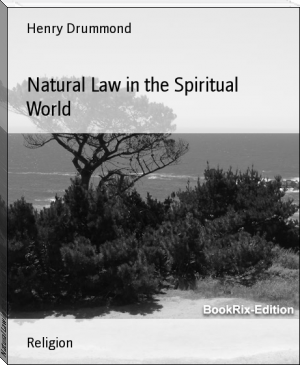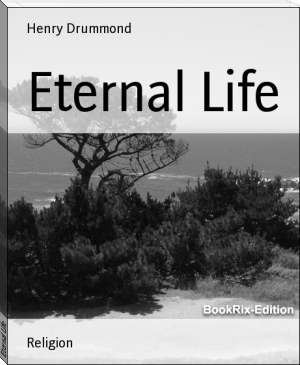Natural Law in the Spiritual World - Henry Drummond (feel good novels txt) 📗

- Author: Henry Drummond
Book online «Natural Law in the Spiritual World - Henry Drummond (feel good novels txt) 📗». Author Henry Drummond
analogies of this law, which have been casually referred to already, are sufficiently familiar to render any further development in these directions superfluous. After the eloquent preaching of the Gospel of Work by Thomas Carlyle, this century at least can never plead that one of the most important moral bearings of the subject has not been duly impressed upon it. All that can be said of idleness generally might be fitly urged in support of this great practical truth. All nations which have prematurely passed away, buried in graves dug by their own effeminacy; all those individuals who have secured a hasty wealth by the chances of speculation; all children of fortune; all victims of inheritance; all social sponges; all satellites of the court; all beggars of the market-place--all these are living and unlying witness to the unalterable retributions of the law of parasitism. But it is when we come to study the working of the principle in the religious sphere there we discover the full extent of the ravages which the parasitic habit can make on the souls of men. We can only hope to indicate here one or two of the things in modern Christianity which minister most subtly and widely to this as yet all but unnamed sin.
We begin in what may seem a somewhat unlooked-for quarter. One of the things in the religious world which tends most strongly to induce the parasitic habit is _Going to Church_. Church-going itself every Christian will rightly consider an invaluable aid to the ripe development of the spiritual life. Public worship has a place in the national religious life so firmly established that nothing is ever likely to shake its influence. So supreme indeed, is the ecclesiastical system in all Christian countries that with thousands the religion of the Church and the religion of the individual are one. But just because of its high and unique place in religious regard, does it become men from time to time to inquire how far the Church is really ministering to the spiritual health of the immense religious community which looks to it as its foster-mother. And if it falls to us here reluctantly to expose some secret abuses of this venerable system, let it be well understood that these are abuses, and not that the sacred institution itself is being violated by the attack of an impious hand.
The danger of church-going largely depends on the form of worship, but it may be affirmed that even the most perfect Church affords to all worshipers a greater or less temptation to parasitism. It consists essentially in the deputy-work or deputy-worship inseparable from the church or chapel ministrations. One man is set apart to prepare a certain amount of spiritual truth for the rest. He, if he is a true man, gets all the benefits of original work. He finds the truth, digests it, is nourished and enriched by it before he offers it to his flock. To a large extent it will nourish and enrich in turn a number of his hearers. But still they will lack something. The faculty of selecting truth at first hand and appropriating it for one's self is a lawful possession to every Christian. Rightly exercised it conveys to him truth in its freshest form; it offers him the opportunity of verifying doctrines for himself; it makes religion personal; it deepens and intensifies the only convictions that are worth deepening, those, namely, which are honest; and it supplies the mind with a basis of certainty in religion. But if all one's truth is derived by imbibition from the Church, the faculties for receiving truth are not only undeveloped but one's whole view of truth becomes distorted. He who abandons the personal search for truth, under whatever pretext, abandons truth. The very word truth, by becoming the limited possession of a guild, ceases to have any meaning; and faith, which can only be founded on truth, gives way to credulity, resting on mere opinion.
In those churches especially where all parts of the worship are subordinated to the sermon, this species of parasitism is peculiarly encouraged. What is meant to be a stimulus to thought becomes the substitute for it. The hearer never really learns, he only listens. And while truth and knowledge seem to increase, life and character are left in arrear. Such truth, of course, and such knowledge, are a mere seeming. Having cost nothing, they come to nothing. The organism acquires a growing immobility, and finally exists in a state of entire intellectual helplessness and inertia. So the parasitic Church-member, the literal "adherent," comes not merely to live only within the circle of ideas of his minister, but to be content that his minister has these ideas--like the literary parasite who fancies he knows everything because he has a good library.
Where the worship, again, is largely liturgical the danger assumes an even more serious form, and it acts in some such way as this. Every sincere man who sets out in the Christian race begins by attempting to exercise the spiritual faculties for himself. The young life throbs in his veins, and he sets himself to the further progress with earnest purpose and resolute will. For a time he bids fair to attain a high and original development. But the temptation to relax the always difficult effort at spirituality is greater than he knows. The "carnal mind" itself is "enmity against God," and the antipathy, or the deadlier apathy within, is unexpectedly encouraged from that very outside source from which he anticipates the greatest help. Connecting himself with a Church he is no less interested than surprised to find how rich is the provision there for every part of his spiritual nature. Each service satisfies or surfeits. Twice, or even three times a week, this feast is spread for him. The thoughts are deeper than his own, the faith keener, the worship loftier, the whole ritual more reverent and splendid. What more natural than that he should gradually exchange his personal religion for that of the congregation? What more likely than that a public religion should by insensible stages supplant his individual faith? What more simple than to content himself with the warmth of another's soul. What more tempting than to give up private prayer for the easier worship of the liturgy or of the church? What, in short, more natural than for the independent, free-moving, growing Sacculina to degenerate into the listless, useless, pampered parasite of the pew? The very means he takes to nurse his personal religion often come in time to wean him from it. Hanging admiringly, or even enthusiastically, on the lips of eloquence, his senses now stirred by ceremony, now soothed by music, the parasite of the pew enjoys his weekly worship--his character untouched, his will unbraced, his crude soul unquickened and unimproved. Thus, instead of ministering to the growth of individual members, and very often just in proportion to the superior excellence of the provision made for them by another, does this gigantic system of deputy-nutrition tend to destroy development and arrest the genuine culture of the soul. Our churches overflow with members who are mere consumers. Their interest in religion is purely parasitic. Their only spiritual exercise is the automatic one of imbibition, the clergyman being the faithful Hermit-crab who is to be depended on every Sunday for at least a week's supply.
A physiologist would describe the organism resulting from such a progress as a case of "arrested development." Instead of having learned to pray, the ecclesiastical parasite becomes satisfied with being prayed for. His transactions with the Eternal are effected by commission. His work for Christ is done by a paid deputy. His whole life is a prolonged indulgence in the bounties of the Church; and surely--in some cases at least the crowning irony--he sends for the minister when he lies down to die.
Other signs and consequences of this species of parasitism soon become very apparent. The first symptom is idleness. When a Church is off its true diet it is off its true work. Hence one explanation of the hundreds of large and influential congregations ministered to from week to week by men of eminent learning and earnestness, which yet do little or nothing in the line of these special activities for which all churches exist. An outstanding man at the head of a huge, useless and torpid congregation is always a puzzle. But is the reason not this, that the congregation gets too good food too cheap? Providence has mercifully delivered the Church from too many great men in her pulpits, but there are enough in every country-side to play the host disastrously to a large circle of otherwise able-bodied Christian people, who, thrown on their own resources, might fatten themselves and help others. There are compensations to a flock for a poor minister after all. Where the fare is indifferent those who are really hungry will exert themselves to procure their own supply.
That the Church has indispensable functions to discharge to the individual is not denied; but taking into consideration the universal tendency to parasitism in the human soul it is a grave question whether in some cases it does not really effect more harm than good. A dead church certainly, a church having no reaction on the community, a church without propagative power in the world, cannot be other than a calamity to all within its borders. Such a church is an institution, first for making, then for screening parasites; and instead of representing to the world the Kingdom of God on earth, it is despised alike by godly and by godless men as the refuge for fear and formalism and the nursery of superstition.
And this suggests a second and not less practical evil of a parasitic piety--that it presents to the world a false conception of the religion of Christ. One notices with a frequency which may well excite alarm that the children of church-going parents often break away as they grow in intelligence, not only from church-connection but from the whole system of family religion. In some cases this is doubtless due to natural perversity, but in others it certainly arises from the hollowness of the outward forms which pass current in society and at home for vital Christianity. These spurious forms, fortunately or unfortunately, soon betray themselves. How little there is in them becomes gradually apparent. And rather than indulge in a sham the budding sceptic, as the first step, parts with the form and in nine cases out of ten concerns himself no further to find a substitute. Quite deliberately, quite honestly, sometimes with real regret and even at personal sacrifice he takes up his position, and to his parent's sorrow and his church's dishonor forsakes forever the faith and religion of his fathers. Who will deny that this is a true account of the natural history of much modern scepticism? A formal religion can never hold its own in the nineteenth century. It is better that it should not. We must either be real or cease to be. We must either give up our Parasitism or our sons.
Any one who will take the trouble to investigate a number of cases where whole families of outwardly godly parents have gone astray, will probably find that the household religion had either some palpable defect, or belonged essentially to the parasitic order. The popular belief that the sons of clergymen turn out worse than those of the laity is, of course, without foundation; but it may also probably be verified that in the instances where clergymen's sons notoriously discredit their father's ministry, that ministry in a majority of cases, will be found to be professional and theological rather than human and spiritual. Sequences in the moral and spiritual world follow more closely than we yet discern the great law of Heredity. The Parasite begets the Parasite--only
We begin in what may seem a somewhat unlooked-for quarter. One of the things in the religious world which tends most strongly to induce the parasitic habit is _Going to Church_. Church-going itself every Christian will rightly consider an invaluable aid to the ripe development of the spiritual life. Public worship has a place in the national religious life so firmly established that nothing is ever likely to shake its influence. So supreme indeed, is the ecclesiastical system in all Christian countries that with thousands the religion of the Church and the religion of the individual are one. But just because of its high and unique place in religious regard, does it become men from time to time to inquire how far the Church is really ministering to the spiritual health of the immense religious community which looks to it as its foster-mother. And if it falls to us here reluctantly to expose some secret abuses of this venerable system, let it be well understood that these are abuses, and not that the sacred institution itself is being violated by the attack of an impious hand.
The danger of church-going largely depends on the form of worship, but it may be affirmed that even the most perfect Church affords to all worshipers a greater or less temptation to parasitism. It consists essentially in the deputy-work or deputy-worship inseparable from the church or chapel ministrations. One man is set apart to prepare a certain amount of spiritual truth for the rest. He, if he is a true man, gets all the benefits of original work. He finds the truth, digests it, is nourished and enriched by it before he offers it to his flock. To a large extent it will nourish and enrich in turn a number of his hearers. But still they will lack something. The faculty of selecting truth at first hand and appropriating it for one's self is a lawful possession to every Christian. Rightly exercised it conveys to him truth in its freshest form; it offers him the opportunity of verifying doctrines for himself; it makes religion personal; it deepens and intensifies the only convictions that are worth deepening, those, namely, which are honest; and it supplies the mind with a basis of certainty in religion. But if all one's truth is derived by imbibition from the Church, the faculties for receiving truth are not only undeveloped but one's whole view of truth becomes distorted. He who abandons the personal search for truth, under whatever pretext, abandons truth. The very word truth, by becoming the limited possession of a guild, ceases to have any meaning; and faith, which can only be founded on truth, gives way to credulity, resting on mere opinion.
In those churches especially where all parts of the worship are subordinated to the sermon, this species of parasitism is peculiarly encouraged. What is meant to be a stimulus to thought becomes the substitute for it. The hearer never really learns, he only listens. And while truth and knowledge seem to increase, life and character are left in arrear. Such truth, of course, and such knowledge, are a mere seeming. Having cost nothing, they come to nothing. The organism acquires a growing immobility, and finally exists in a state of entire intellectual helplessness and inertia. So the parasitic Church-member, the literal "adherent," comes not merely to live only within the circle of ideas of his minister, but to be content that his minister has these ideas--like the literary parasite who fancies he knows everything because he has a good library.
Where the worship, again, is largely liturgical the danger assumes an even more serious form, and it acts in some such way as this. Every sincere man who sets out in the Christian race begins by attempting to exercise the spiritual faculties for himself. The young life throbs in his veins, and he sets himself to the further progress with earnest purpose and resolute will. For a time he bids fair to attain a high and original development. But the temptation to relax the always difficult effort at spirituality is greater than he knows. The "carnal mind" itself is "enmity against God," and the antipathy, or the deadlier apathy within, is unexpectedly encouraged from that very outside source from which he anticipates the greatest help. Connecting himself with a Church he is no less interested than surprised to find how rich is the provision there for every part of his spiritual nature. Each service satisfies or surfeits. Twice, or even three times a week, this feast is spread for him. The thoughts are deeper than his own, the faith keener, the worship loftier, the whole ritual more reverent and splendid. What more natural than that he should gradually exchange his personal religion for that of the congregation? What more likely than that a public religion should by insensible stages supplant his individual faith? What more simple than to content himself with the warmth of another's soul. What more tempting than to give up private prayer for the easier worship of the liturgy or of the church? What, in short, more natural than for the independent, free-moving, growing Sacculina to degenerate into the listless, useless, pampered parasite of the pew? The very means he takes to nurse his personal religion often come in time to wean him from it. Hanging admiringly, or even enthusiastically, on the lips of eloquence, his senses now stirred by ceremony, now soothed by music, the parasite of the pew enjoys his weekly worship--his character untouched, his will unbraced, his crude soul unquickened and unimproved. Thus, instead of ministering to the growth of individual members, and very often just in proportion to the superior excellence of the provision made for them by another, does this gigantic system of deputy-nutrition tend to destroy development and arrest the genuine culture of the soul. Our churches overflow with members who are mere consumers. Their interest in religion is purely parasitic. Their only spiritual exercise is the automatic one of imbibition, the clergyman being the faithful Hermit-crab who is to be depended on every Sunday for at least a week's supply.
A physiologist would describe the organism resulting from such a progress as a case of "arrested development." Instead of having learned to pray, the ecclesiastical parasite becomes satisfied with being prayed for. His transactions with the Eternal are effected by commission. His work for Christ is done by a paid deputy. His whole life is a prolonged indulgence in the bounties of the Church; and surely--in some cases at least the crowning irony--he sends for the minister when he lies down to die.
Other signs and consequences of this species of parasitism soon become very apparent. The first symptom is idleness. When a Church is off its true diet it is off its true work. Hence one explanation of the hundreds of large and influential congregations ministered to from week to week by men of eminent learning and earnestness, which yet do little or nothing in the line of these special activities for which all churches exist. An outstanding man at the head of a huge, useless and torpid congregation is always a puzzle. But is the reason not this, that the congregation gets too good food too cheap? Providence has mercifully delivered the Church from too many great men in her pulpits, but there are enough in every country-side to play the host disastrously to a large circle of otherwise able-bodied Christian people, who, thrown on their own resources, might fatten themselves and help others. There are compensations to a flock for a poor minister after all. Where the fare is indifferent those who are really hungry will exert themselves to procure their own supply.
That the Church has indispensable functions to discharge to the individual is not denied; but taking into consideration the universal tendency to parasitism in the human soul it is a grave question whether in some cases it does not really effect more harm than good. A dead church certainly, a church having no reaction on the community, a church without propagative power in the world, cannot be other than a calamity to all within its borders. Such a church is an institution, first for making, then for screening parasites; and instead of representing to the world the Kingdom of God on earth, it is despised alike by godly and by godless men as the refuge for fear and formalism and the nursery of superstition.
And this suggests a second and not less practical evil of a parasitic piety--that it presents to the world a false conception of the religion of Christ. One notices with a frequency which may well excite alarm that the children of church-going parents often break away as they grow in intelligence, not only from church-connection but from the whole system of family religion. In some cases this is doubtless due to natural perversity, but in others it certainly arises from the hollowness of the outward forms which pass current in society and at home for vital Christianity. These spurious forms, fortunately or unfortunately, soon betray themselves. How little there is in them becomes gradually apparent. And rather than indulge in a sham the budding sceptic, as the first step, parts with the form and in nine cases out of ten concerns himself no further to find a substitute. Quite deliberately, quite honestly, sometimes with real regret and even at personal sacrifice he takes up his position, and to his parent's sorrow and his church's dishonor forsakes forever the faith and religion of his fathers. Who will deny that this is a true account of the natural history of much modern scepticism? A formal religion can never hold its own in the nineteenth century. It is better that it should not. We must either be real or cease to be. We must either give up our Parasitism or our sons.
Any one who will take the trouble to investigate a number of cases where whole families of outwardly godly parents have gone astray, will probably find that the household religion had either some palpable defect, or belonged essentially to the parasitic order. The popular belief that the sons of clergymen turn out worse than those of the laity is, of course, without foundation; but it may also probably be verified that in the instances where clergymen's sons notoriously discredit their father's ministry, that ministry in a majority of cases, will be found to be professional and theological rather than human and spiritual. Sequences in the moral and spiritual world follow more closely than we yet discern the great law of Heredity. The Parasite begets the Parasite--only
Free e-book «Natural Law in the Spiritual World - Henry Drummond (feel good novels txt) 📗» - read online now
Similar e-books:





Comments (0)